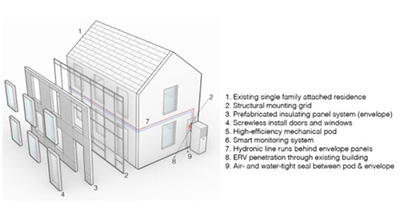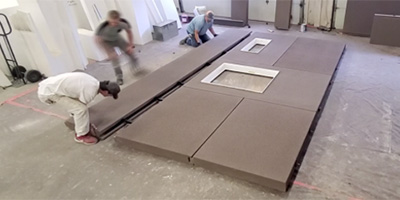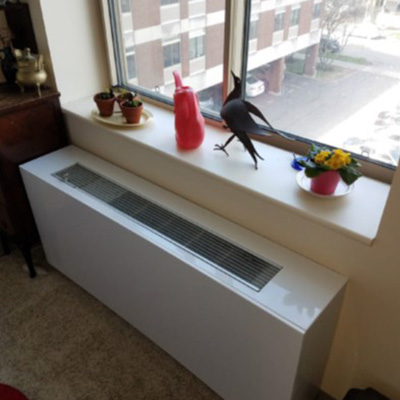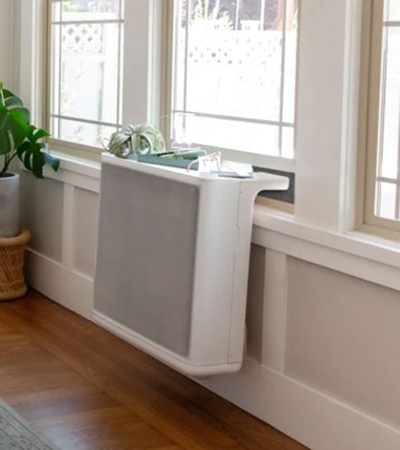Innovation Invites Collaboration

Spotlight on Innovative Multifamily & Apartment Solutions
Problem: Most buildings in New York State (70%) were built before energy codes were established. As a result, they typically lack adequate insulation and air sealing. In Upstate New York – and the Northeast in general – new construction and retrofits must align heating and cooling efficiency and comfort across winter and summer, where there are wide temperature swings.
Solution: Four collaborative projects address the State’s multifamily building stock. They showcase new ways that NYSERDA funding supports New York State innovation, manufacturing, and clean energy solutions accommodating large buildings with compact living spaces. Climate Act Goals: Decrease emissions with efficient electrification. Create solutions for low- and moderate-income housing benefiting residents in historically disadvantaged communities.
SPOTLIGHT 1:
Syracuse University Architectural Team, Cocoon Construct, and TKFabricate
An architectural school collaborates with local manufacturers to create a two-part cold-climate solution for multifamily residences.
BOOST: Over two phases, NYSERDA investment ($50K + $800K) with U.S. Dept. of Energy investment ($500,000 + $5M cost share)
BREAKTHROUGH:
Part One: An externally installed set of prefabricated panels that arrive onsite as a snap- together kit. The panels are made of materials researched and designed by Syracuse University and made by NYS manufacturers.
The panels attach to the exterior façade of a building up to 4 stories in height. They accommodate windows and doors and increase a building’s insulation value. Once a building has better insulation value, the mechanical heating and cooling units can have a smaller footprint, saving occupants money on energy costs.
Part Two: An Energy Pod, or an HVAC solution in a box. The Pod is delivered on site, after panels have been installed. The Pod contains a compact, easy-to-install (for professionals) air source heat pump for heating and cooling, plus a compact hot water heat pump. With insulation and air sealing managed by the panels, the interior mechanicals are non-invasive and a great fit for small spaces.
TECHNOLOGY: Prefabricated Panels + Energy Pod
NEW CONSTRUCTION OR RETROFIT: Retrofit
ON THE MARKET: The project entered test/monitoring phase early 2023. The Panels + Pods are expected to be market ready in approximately 1–2 years.
Elements of the whole building retrofit solution.

- Existing single family attached residence
- Structural mounting grid
- Prefabricated insulating panel system (envelope)
- Screwless install doors and windows
- High-efficiency mechanical pod
- Smart monitoring system
- Hydronic line runs behind envelope panels
- ERV penetration through existing building
- Air- and water-tight seal between pod & envelope
Exterior wall panels, prefabricated offsite.


SPOTLIGHT 2:
Ice Air and Steven Winter Associates
Super-efficient, compact heat pump solution that doesn’t strain the grid.
BOOST: NYSERDA investment $255,000
BREAKTHROUGH: Traditional heat pump designs often require back-up electric resistance heating on cold days, which is inefficient. Ice Air, a manufacturer located in Westchester County, NY, and Steven Winter, a building efficiency consultant agency, with an office in Manhattan, commercialized a package terminal heat pump (PTHP). The PTHP avoids the use of electric resistance heating in apartments and its design operates to -5 degrees F.
TECHNOLOGY: Cold-climate packaged terminal heat pump
NEW CONSTRUCTION OR RETROFIT: New
ON THE MARKET: Commercially available now

SPOTLIGHT 3:
Gradient, NYPA, and NYCHA
Improving heating and cooling efficiency in space-constrained multifamily units.
BOOST: $15 million from NYSERDA. 2022 Winner, “Clean Heat for All” Challenge, with the possibility to provide 10,000 cold-climate units to New York City Housing Authority (NYCHA).
BREAKTHROUGH: This collaboration between Gradient, NYSERDA, New York Power Authority, and NYCHA created a window-mounted heat pump that heats and cools apartments in multifamily buildings. It uses less electricity than other alternative electric heating options. Installed half in the building, half out, it takes up less space than a window-mounted air conditioner. Additionally, the small size and easy manageability make it suitable for a two-person DIY install.
TECHNOLOGY: Portable, window-mounted heat pump, with next generation refrigerant
ON THE MARKET: Products expected for demonstration by the end of 2023
SPOTLIGHT 4:
Feedback Solutions
Controlling ventilation to reduce wasted energy in multifamily units.
BOOST: $86,657 from NYSERDA
BREAKTHROUGH: A significant amount of energy is wasted due to always-on HVAC ventilation systems. This unique sensor system uses infrared (IR) light, which monitors real-time room occupancy while protecting privacy. When integrated with the software + dashboard, the platform enables real time demand control ventilation. The potential for efficiency increases, operating costs and greenhouse gas emissions go down, and HVAC energy consumption can be reduced by approximately 30%.
TECHNOLOGY: IR sensors + software + dashboard
ON THE MARKET: Commercially available now
Want to speak with a member of the Innovation@NYSERDA team?
Email [email protected] or call 1-866-NYSERDA.
